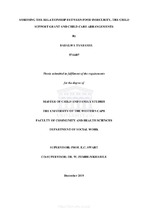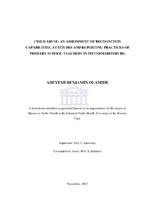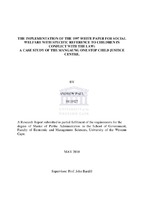Assessing the relationship between food security, the child support grant and child care arrangements
Abstract
Food insecurity exists when people lack access to sufficient quantities of safe and nutritious food which encourages normal growth and development. Given South Africa’s high poverty and unemployment levels, food insecurity has become endemic in many communities. The purpose of the study was to determine and explore the relationship between food insecurity, child care arrangements and the child support grant (CSG).
The study was conducted among a sample of 120 participants, comprising both CSG recipients and non-recipients (who were purposefully selected from an ongoing cohort study), residing in Langa township in Cape Town. A sequential, mixed-model research design was used, in which both qualitative and quantitative research methods were applied. Data was collected by means of questionnaires, interviews and focus groups. The results were analysed using SPSS and Atlas ti software. The ecological systems theory being used as a theoretical framework to explore the different dimensions of child care arrangements.
In the literature it is hypothesised that food insecure families are more likely to have child care arrangement instabilities. Interestingly, the study’s findings did not support this hypothesis. Although most of the participants were unemployed, they generally stayed at home to care for their children because they were recipients of the CSG. Therefore, despite being food insecure, many households had stable child care arrangements because of the CSG. Child support grant recipient households experienced hunger less acutely than households that did not receive the grant. Of course, social protection mechanisms, like grants, do not represent a sustainable solution to South Africa’s unemployment and food insecurity challenges. The researcher therefore provides a number of recommendations on how government and civil society can ameliorate the plight of poor households.
Collections
Related items
Showing items related by title, author, creator and subject.
-
Child abuse: an assessment of recognition capabilities, attitudes and reporting practices of primary school teachers in Pietermaritzburg
Adeyemi, Benjamin Olamide (2013)Background: Child abuse is a global public health problem with serious consequences for the victims and society. Most studies on child maltreatment in South Africa have focused on the role of teachers as perpetrators and ... -
Corporal punishment of children in Nigerian homes
Azong, Julius Awah (University of the Western Cape, 2011) -
The implementation of the 1997 white paper for social welfare with specific reference to children in conflict with the law: a case study of the mangaung one stop child justice centre
Paul, Andrew (2010)Whilst policy formulation has been extensively studied and theorised in the literature, far less attention has been paid until fairly recently to the issue of policy implementation. For a long time it was more or less ...




